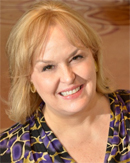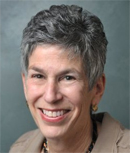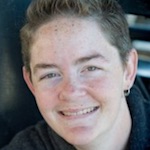Robin McCasland, internal PR staffer at Dell and new chair of the International Assn. of Business Communicators, should apologize for her remarks June 25 likening reporters to dogs "humping" in the park.
 McCasland |
"We've had some people who've been the dogs and I'm hoping that if we communicate more effectively and do our part and make you that promise that some of you won’t be dogs anymore," she said.
Critics of IABC have included us; Dave Murray of writingboots.typepad.com; Neville Hobson of www.forimmediaterelease.com; Ed Lallo of www.newsroomink.com and Roger D'Aprix, longtime member.
Unlike PR Society of America, where O'Dwyer media are the only ones reporting the finances of the Society or expressing criticism of its practices, IABC has a number of visible critics. It allows reporters at its AGM and town hall and supplies a tape of the AGM. The PR Society stopped supplying tapes of its Assembly as of 2005 and barred the press from its 2011 and 2012 Assemblies.
IABC Leaders: Testy & Cranky
The IABC board, under fire for hiring executive director Christopher Sorek who promptly fired 16 of the 32 staffers and was himself cashiered before completing his first year, instead of being apologetic for this mistake, lashed out at critics at the annual meeting and the town hall that followed it.
Leaders, as noted by Murray at the town hall, have not been available to the press for questioning for about six months. He said the only person he has been able to reach is Aaron Heinrich, who has become communications director after being a consultant.
 A press conference should have been called shortly after the staff "massacre" of Friday, Nov. 30, 2012. Instead, staff and elected leaders went into the bunkers.
A press conference should have been called shortly after the staff "massacre" of Friday, Nov. 30, 2012. Instead, staff and elected leaders went into the bunkers.
"There's no time for interviews, nobody ever gets back to me, nobody ever wants to talk on the phone," Murray told the town hall.
McCasland answered she had no knowledge of him trying to contact her and said that almost no other press ever calls IABC.
She said she doesn’t mind dealing with the press but not if it is "just to gossip about IABC or not write a fair story. We want coverage, the good and the bad, but it needs to be a fair story."
Outgoing chair Kerby Meyers expressed annoyance with the PR trade press, accusing reporters of "getting personal."
"If it's personal, I get sensitive and I shut down," he told town hall. He says he has put "a lot of time" into IABC and does not appreciate "attacks" of any sort.
Paige Wesley, former VP-communications and marketing, posted on her website a 2,492-word essay saying that the atmosphere at IABC h.q. became “seriously toxic” after Sorek was hired.
Massive Stonewalling Goes On
Despite claims of wanting to communicate, IABC is refusing to provide any details of what the abortive hiring of Sorek has cost or give any new financial report beyond Dec. 31, 2012.
 Lazarus |
Lazarus, who specializes in working for nonprofits that are in transition, was most recently interim president, St. Francis Foundation, which supports St. Francis Memorial Hospital, San Francisco.
IABC’s 2012-13 Board Was Derelict
Meyers and McCasland, leaders of the derelict 2012-13 board that sat on its hands for the Nov. 30 staff massacre, act testy and cranky when questioned about it rather than apologetic.
The make-up of the board is odd—five of the 12 are based abroad although more than 90% of IABC’s 14,000 members are in the U.S. or Canada. Staff likes directors who are far, far away.
Based in the U.K. are Russell Grossman of the U.K. Government’s Dept. for Business; Kristen Sukalac of Prospero Communications, and Gloria Walker, a solo practitioner who is a part-time lecturer at the University of West London.
Vita Kernel operates Studio Kernel in Slovenia. Adrian Cropley, past chair, is a solo practitioner in Melbourne, Australia.
Jeff Bishop is with the Forest Products Assn. of Nova Scotia and lives in Truro, NS.
Dell, Intel, Time Warner, Directv on Board
Practitioners who represent four major publicly-held, U.S.-based companies were also on the 2012-13 board.
None of the companies would countenance withholding financial information as is practiced by the IABC board. Public companies are under the lash of the SEC and stockholders to cough up financial data quickly.
McCasland is employee engagement/internal communications lead for the services division of Dell, Round Rock, Texas ($56 billion in sales in 2012).
James Lynch is director of employee centered solutions at Intel, Santa Clara, Calif. ($53B sales).
Michael Ambrozewicz is manager of corporate communications and diversity & inclusion at Directv, El Segundo, Calif. ($30B). He oversees communications for the U.S workforce, Enterprise employees, Human Resources program and benefit plan participants.
Terry Cerisoles is VP of technology communications for the Turner Broadcasting System, part of Time Warner ($28B).
Also based in the U.S. are Tom Roux, a writer and editor in Milton, Mass., and outgoing chair Kerby Meyers, who heads The Communications Refinery PR firm in Denver.
Jobs Are in Internal PR; No New Yorkers
The job descriptions of the directors show many are involved in employee communications rather than dealing with the press. IABC started out as a group of industrial editors. Describing most members as “house organ editors” would not be inaccurate.
Lacking on the board are any directors from New York, the nearest being Roux who is in Milton, Mass.
Ignored is the dictum of Sarbanes-Oxley—that most members of a board be outsiders so that fresh viewpoints are obtained and cronyism and conformity are reduced.
Critics of board behavior include Nell Minow of GMI Ratings who says directors lose half their I.Q.'s and all their guts and James Surowiecki of the New Yorker who says boards are hotbeds of conformity and self-seeking.
Reporters, editors of major media and directors of journalism groups should be on the IABC board. Such a board would not have allowed the Friday Night Massacre.
PR Groups Have Had Costly COOs
Staff heads of PR groups, many of them association rather than PR careerists, have been costly to the groups.
Julie Freeman’s pay package for 2011, her last year, totaled $209,005. We bet Sorek was also getting about $200,000 for his year. We assume he is getting a year’s severance pay of about $200K. What is the contract of the new executive director Lazarus?!
IABC has acknowledged taking a $370,000 loan for website overhaul and tech upgrades. All staffers have been given memberships in IABC with IABC picking up the tab, the AGM was told.
The 2012 audit showed $1,981,970 invested in stocks and $1,072,213 in a "non-interest-bearing account" as of Dec. 31, 2012. Members need to know the status of those accounts as of June 30.
The Arthur W. Page Society, which is about 400 corporate executives and some PR firm CEOs, recently paid a bundle for an abortive experiment with having a PR trade editor as its president.
Julia Hood, who was editor-in-chief of PR Week/U.S. from 2002-2008 and then publishing director of PRW and DM News, was named president of Page in June 2010. She only lasted 18 months but for that period she received a total $394,910 according to IRS Form 990s on file.
The 2010 form says Hood got $103,889 for pay and $16,345 from "other organizations." The 2011 form said she got $182,312 pay; a $50,000 bonus; $2,603 other reportable pay; $7,047 retirement and other deferred compensation, and non-taxable benefits of $32,714.
Roger Bolton, who succeeded Hood as president, says Hood was paid a total of $338,803 for her tenure. Even so, that is a lot.
Hood, although her office was two blocks from ours, never met with us or talked to us on the telephone. A few e-mails were exchanged, one of them saying there was no room for us at the 2011 spring dinner. We said we would just go to the cocktail reception and she e-mailed back that a place had been found for us.
Attempts to reach Bill Margaritis, chair of Page during Hood's tenure, were unsuccessful as are attempts to reach Jon Iwata of IBM, current chair. We are only allowed to deal with Bolton.
Gaulke, Bolton Were Costly For PRSA
Three costly COOs come to mind for PR Society of America.
Ray Gaulke, who had a career in advertising and newspaper publishing, joined PRSA in 1994 as COO with orders to "get tough" with the press.
One of his first tangible acts was to come down from the stage at the 1994 Assembly to the New York delegation table where we were sitting. He took us by the arm and led us to the back of the room as more than 250 delegates watched. We were told to stay there or face eviction.
We had sat with the New York delegation for decades up until then where we were able to take pictures and see the faces of delegates as they made speeches.
Gaulke was given a five-year-contract for $250,000 yearly starting in 2000 but this was cancelled after one year. He accepted $250,000 in severance pay.
Catherine Bolton (no relation to Roger), who succeeded Gaulke as COO after serving three months as chief PR officer, held the post for six years, receiving a severance payment of $300,000 and $28,000 yearly in pension benefits when she left at the end of 2006. Bolton, who had announced her intended resignation at the end of 2005, was embroiled in a well-publicized legal battle that year with an employee of the Society who had questioned her competence in an anonymous e-mail to the board.
She sought the identity of the staffer, who signed complaints about her as "Catherine Hater," for the purpose of suing the complainer for libel. The staffer tried to block this and lost. The legal proceedings were given extensive coverage in the New York Law Journal.
It detailed the e-mailer’s criticisms including that Bolton “cannot manage or lead an organization” and that her “quarterly reports to staff are garbage, often met with rolling eyes.” The complainer urged the board to “boot Bolton and pay her severance.” The e-mail said staff morale was “at an all-time low.”
New York Superior Court ruled Bolton had a “prima facie” case for libel charges. No such action was filed.
Association Exec Murray to PR Society
William Murray, a career association executive previously with the Motion Picture Assn., joined the PR Society in January 2007 as president. His package for 2011, the latest year available, totaled $382,013. Seven other staffers made more than $100,000.
The legal, medical and accounting professional groups always have a staff head who is a lawyer, doctor or CPA, respectively. PR groups should take notice and appoint staff heads who can deal with the press.
Several directors of the International PR Assn., London, resigned in 2011 to protest what they said were abuses in financial reporting and governance including dissolution on May 5, 2011 of the IPRS Council, the 74-member legislature of the group.
At one point, staff head James Holt resigned although he later returned to that post. Dissident directors, including Elizabeth Ananto of Indonesia, 2010 president, said they did not get adequate financial reports.


 IABC, reflecting declines in corporate PR employment, showed a drop in net assets from $1M in 2012 to $222K in 2016 after a dip to $14K in 2015.
IABC, reflecting declines in corporate PR employment, showed a drop in net assets from $1M in 2012 to $222K in 2016 after a dip to $14K in 2015. Claire Watson,
Claire Watson, The International Association of Business Communicators, which lost $529K in 2013, needs new sources of revenues and should target the 28 million small and medium-sized businesses in the U.S., says chair Russell Grossman.
The International Association of Business Communicators, which lost $529K in 2013, needs new sources of revenues and should target the 28 million small and medium-sized businesses in the U.S., says chair Russell Grossman. A dispute with web builder that has tied up $552,067 in funds, zooming severance and legal payments from firing 16 staffers en masse, “whopping” rent of $430,000, zoomng board expenses and other financial woes were told to IABCers yesterday.
A dispute with web builder that has tied up $552,067 in funds, zooming severance and legal payments from firing 16 staffers en masse, “whopping” rent of $430,000, zoomng board expenses and other financial woes were told to IABCers yesterday. Melissa Dark, an Australian internal communications consultant and former corporate staffer, has joined International Association of Business Communicators in San Francisco as director of communication and member services.
Melissa Dark, an Australian internal communications consultant and former corporate staffer, has joined International Association of Business Communicators in San Francisco as director of communication and member services.


 Have a comment? Send it to
Have a comment? Send it to 
No comments have been submitted for this story yet.